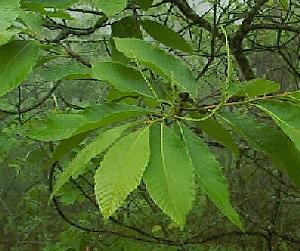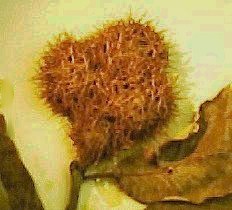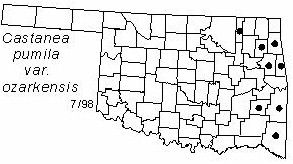

Small tree to 10 m (30 ft) tall, or a shrub. Bark light gray, with scaly plates and ridges. Twigs slender, gray, with blunt brown buds. Leaves alternate, narrowly oblong or lanceolate, 12-20 cm (5-8 in) long and 4-8 cm (1.6-3.2 in) wide, with many straight parallel side veins each ending in a long tooth on the coarsely serrate margin, glabrous green above, pale green below. Fruits are spiny round burs 25-30 mm (1-1.2 in) in diameter. Seeds are small chestnuts (15 mm) and are edible.
Distribution: Native to the Ozark-Ouachita region and northern Alabama.
Comment: This species is affected by the chestnut blight, but not as severely as the American chestnut. The varieties of C. pumila are often considered to be separate species. Castanea is the ancient Greek and Latin name for chestnut; pumila refers to the small size of the tree; ozarkensis refers to the Ozark Mountains.
Habitat: oak-hickory upland forests.
NWI status: none
Distribution in Oklahoma: 
BACK
NEXT
RETURN TO INDEX
Last update: 9/9/99
 Go to Oklahoma Biological Survey Home Page
Go to Oklahoma Biological Survey Home Page
 Disclaimer
Disclaimer